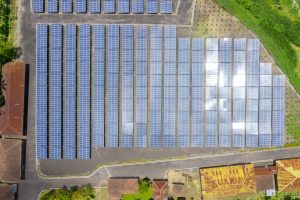Indonesia’s government says that it has relaxed its local content requirements in the energy sector, in a bit to attract concessional funding for renewable energy investments from international development banks, Reuters reported yesterday.
The news agency quoted Rachmat Kaimuddin, the deputy minister of maritime affairs and investment, as saying that the government had passed a new regulation, under which it will exempt projects that receive at least 50 percent funding from foreign multilateral or bilateral lenders from the local content rules.
“If we’re using funds from development financing agencies that have different procurement rules, in which we are a member, we can follow an agreement that we set,” Rachmat told a briefing for the electrical industry. “The reason we’re doing this is we want concessionality from development financial institutions.”
Under Indonesia’s current rules, all electricity for public consumption infrastructure must use domestically produced goods and services. Under Industry Ministerial Regulation No. 54/2012, solar power projects are subject to a local content requirement of 40 percent; hydropower plants must have at least 50 percent local, and geothermal plants a minimum of 30 percent. This regulation is one of the country’s suite of local content requirements, or LCRs, which are intended to ensure that foreign investment promotes the growth of domestic manufacturing and technological capacity.
However, there have been lingering concerns that the LCRs in the energy sector have slowed the disbursement of funds from the $20 billion Just Energy Transition Partnership (JETP). First announced in November 2022, JETP aims to smooth Indonesia’s transition to net zero by 2050, and promote its shift from dirty coal-powered electricity to cleaner forms of energy. Under the Partnership, an International Partners Group (IPG) comprising the Group of Seven countries, Norway, and Denmark has promised to mobilize $10 billion in financing, with an equal amount from a private sector alliance.
In August of last year, Scot Marciel, who served as U.S. ambassador to Indonesia from 2010-2013, argued in The Diplomat that JETP offered a golden opportunity for Indonesia to speed its transition to green energy, and make itself a more attractive destination for foreign investment. But he noted that “the current regulatory environment, including Jakarta’s local content requirement, makes investing in renewable energy unattractive.”
According to another assessment published on the JETP Indonesia website, the local content regulations “restrict developers’ ability to source supplies from outside Indonesia, where the costs of renewable energy components for Solar PV, wind, and battery, have fallen rapidly in recent years. As a result, demand for renewable energy is directly impacted by these high prices and capacity constraints.”
As a result, there are increasing demands for the government to reassess its LCRs, with JETP Indonesia calling on the government to “Revisit existing regulations for LCR application on government procurements that are financed by multinational development banks.”
Under the new regulation, Reuters reported, solar power plant projects will be allowed to use imported panels, “provided the project operator obtains a ministerial approval, signs a power purchase agreement before the end of 2024 and the plant operates by the first half of 2026.” The solar panels must “also come from companies that commit to investing in a production facility in Indonesia.”
The move does not mark a definitive step away from the LCRs, but rather a tweak to the system in order to balance the need for foreign investment and the development of local industries. Whether this balance can be achieved under the new regulation, or whether Jakarta will need to make additional, more dramatic changes to its LCR regime remains to be seen.
































